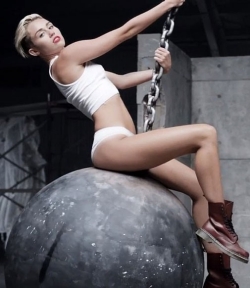The femme fatale in question is characterized by lots of skin, tongue sticking and twerking; a provocative dance.
Few would doubt her status as global phenomenon, though some would question how Miley Cyrus got there.
In an open letter to Cyrus, feminist singer Sinead O’Connor wrote: “Nothing but harm will come in the long run from allowing yourself to be exploited.”
Kerry McElroy, a film historian and feminist scholar at Concordia’s Simone de Beauvoir Institute — also a PhD candidate at the Centre for Interdisciplinary Studies in Society and Culture — questions aspects of the singer’s epic fame:
“She comes across as really manufactured,” says McElroy. “She’s playing to a male corporate interest.”
“I get the impression she’s being told what’s sexy.” This will not ensure longevity, McElroy explains. “Someone will come along and be the next younger, sexier person.”
McElroy also notes that the culture of celebrity is “exploitative and misogynistic towards female celebrities,” indicating that Cyrus herself isn’t to blame.
She appropriates culture. Twerking, popularized by Cyrus at the VMAs where she performed “Blurred Lines” with Robin Thicke, and her eye-grabbing haircut “come from 90s black hip-hop culture,” notes McElroy.
“You shouldn’t appropriate another’s culture if you don’t understand it,” explains McElroy.
Her persona eclipses her talent. McElroy distinguishes between good fame and bad fame. Artists like British singer Adele possess “good fame,” as they’re recognized for their talent.
Cyrus, on the other hand, has “bad fame.” Her femme fatale persona is given much more attention than her talents. “If the most amazing talents were the most famous people, we would have a really different entertainment industry,” notes McElroy.
She’s controversial. Drawing from all of the above, the former Disney star’s unprecedented superstardom is based on controversy.
 Pop star Miley Cyrus | Photo: Miley Cyrus Instagram
Pop star Miley Cyrus | Photo: Miley Cyrus Instagram
 Kerry McElroy, PhD candidate, Concordia Centre for Interdisciplinary Studies in Society and Culture | Photo: Concordia University
Kerry McElroy, PhD candidate, Concordia Centre for Interdisciplinary Studies in Society and Culture | Photo: Concordia University